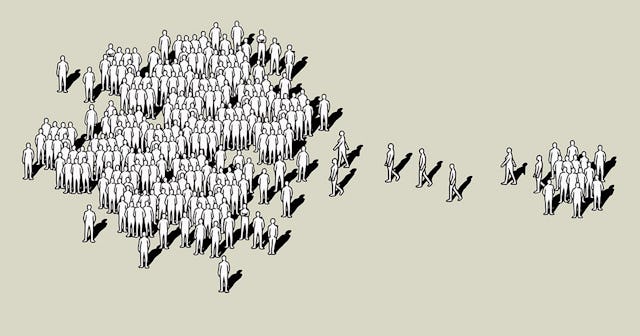Why The U.S. Needs More 'Dugnad' ASAFP

There are lots of things to love about the United States. Baseball and apple pie. A kick ass national parks system. AOC, RBG and the Obamas. The U.S. is filled with rugged pioneers and creative innovators. We are bold and independent.
Unfortunately, all that bold independence and rugged individualism comes with a steep price. And we are paying it now.
While the rest of the world seems to be facing the coronavirus pandemic with unity and sacrifice, here in America we’re fighting over something as simple as face masks. We’re shouting about “freedom” when what we really mean is shunning responsibility. We’re taking an “each person for themselves” approach – at it is killing us. Literally.
Over the past couple of months, it has become abundantly clear that the United States is doing something wrong. We are not the exceptional nation we pride ourselves on being; we are selfish and arrogant. We are not united at all; we’re disconnected and fractured.
If ever there was a time for a come to Jesus moment, folks, this is it. We don’t need any more individualism or independence; we need community and unity. We need a little dugnad, as the Norwegians call it.
As Kelsey L.O. recently wrote on Medium, dugnad might be the reason that, contrary to here in the States, Norway has seen its coronavirus cases plummet and is well on its way to “normalcy.” As she described, dugnad is similar to the concept of “barn raising,” an all-hands-on-deck approach to handling a problem or a crisis.
“Dugnad (pronounced doog-nahd); a Norwegian cultural tradition where community members work together towards a common goal, for the greater good for all…It can be traced back to as early as the Viking Age, where villagers would work shoulder to shoulder to their bring ships on to land from the sea after excursions.”
Malte Mueller/Getty
Today dugnad, she writes, is what brings a community together to rake leaves in the neighborhood park or fundraise for the local soccer team. “Dugnad is not a one-person job. It’s something done in collaboration with others to create a better life for everyone in the community,” Kelsey L.O. writes. “And though it can be a pain in the butt to rake leaves with your neighbors on your day off, a sense of civic duty supersedes any annoyance one may hold. It is the Norwegian way, after all: bite your teeth together and get what needs to be done, done.”
It’s that acknowledgement that this is annoying or uncomfortable for everyone, but worth the effort, that makes all the difference, I think. It is what is preventing us from getting a handle on the pandemic here in the United States.
Take the issues of school re-opening, for instance. Simply put, there are no good answers. If we physically reopen schools, we put the health and safety of students, teachers and entire communities at risk. If we go to remote learning, we risk the mental health of kids and parents, we potentially set back kids’ academic and social development, and we make it harder for parents to get back to work.
But instead of screaming about how KIDS NEED TO BE BACK IN SCHOOL or threatening to take funding away from those schools that don’t physically reopen or pulling our kids out of public schools, what if we applied a little dugnad to the issue? It would be an all-hands approach to the problem. Bottom line: large groups of kids in a confined space is not safe. So what if we came together as communities, grit our teeth, and came up with creative solutions to the problem?
That might look like folks who can work from home offering to host a few kids whose parents are essential workers during the day. It might look like churches and community groups opening their doors to provide childcare, at low or no cost. It might look like employers offering child care reimbursement. It might look like those parents who can handle remote learning choosing that option so that the families who need in-person learning can do that with safer, more socially distant classrooms. And it sure as hell, would not look like a president who makes threats on Twitter and shirks all responsibility to come up with a national plan to this crisis while also mocking those who are trying to look out for others.
There are a lot of things that I love about the United States, but I’ll be honest: I really struggle to come up with things right now. We have shown ourselves to be selfish and weak when faced with this challenge. The so-called “American dream” is a nightmare built on selfishness, short-sightedness, and egocentrism – and it isn’t something I want to be a part of.
I want to live in a country that doesn’t just pay lip-service to the word “united,” but actually lives it out. A country that favors community and sacrifice for the greater good over individuality and greed for personal gain. A country where we look out for each other, and take care of one another, so that together we can be greater than the sum of our parts.
I don’t know how or when we’ll see an end to this nightmare we’re in right now, but I do know that a little dugnad would be a great start.
This article was originally published on